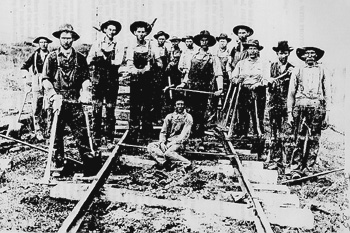
The Maintenance of Way Workers and the Maine Central Railroad,
1901
This is the third excerpt of Déjá Vu, The Maintenance of Way Workers and
the Maine Central Railroad, 1901 by Professor Charles A. Scontras from the
Bureau of Labor Education, University of Maine.
A. B. Lowe of Canada, Grand Vice President of the Brotherhood, who had arrived in
Portland to shepherd the strikers to victory, provided a description of the historic
vulnerability of the trackmen to cost cutting practices of management:
When times got dull ... and traffic receipts fell off and the shareholders' interest
had to be paid so their rich men would not miss any of the luxuries they and their
families were accustomed to, the invariable rule on all roads, the Maine Central neither
worse nor better than the rest, was to cut the trackmen's pay. The rule, too, was to be
very forgetful in the raising of it again.
The trackmen, the labor leader declared, had learned that union power was necessary to
check the concentration and arbitrary exercise of power by management and to secure a
greater share of the wealth labor created. "Organized greed" on the part of
employers was responsible for unionism among the trackmen, Lowe asserted, and "we
propose ... to make organized greed share with us the wealth we so largely help to create,
and to meet our employers as equals." He revealed the grasping hands of the property
owners who placed considerations of profit above safety by declaring that " ...
rather than yield a share of the wealth which is justly ours," the Maine Central
preferred to jeopardize the safety of its passengers, engine, and trainmen by permitting
them to travel over rails that had not been inspected.
The enthusiasm of the strikers and their hopes for a more equitable distribution of
wealth and power were sustained by the presence of the Grand Vice President and the
General Organizer, R. P. Neal of Boston. They were emboldened also by the inspirational
communications sent to them by the Grand President of the union, John T. Wilson, and the
promise of strike benefits of twenty dollars a month should the strike extend beyond two
weeks.
The strikers were further bolstered in their determination to win when they learned
that the engineers of the Canadian Pacific Railway served notice to the Maine Central that
they would not travel their tracks between Vanceboro and Mattawamkeag after a twenty-four
hour period following the strike call. The trackmen expected the engineers, firemen, and
other railroad workers, who understood the dangers presented by "washouts or
spreading rails," to quickly follow suit and refuse to go on the roads unless trained
men were in charge of the tracks. The strikers believed that fellow railroad workers,
motivated by a blend of safety and sympathy, would force the company to yield to the
demands of the strikers in two days. A certificate signed by 800 men, which granted their
grievance committee full power to negotiate an end to the strike, testified to the
confidence and initial solidarity of the strikers.
The enthusiasm of the strikers was checked, however, when they learned that the
engineers and firemen did not strike in sympathy or out of concern for their own safety.
Even the Canadian Pacific engineers, who had earlier indicated they would not travel over
the Maine Central Railroad tracks, failed to follow through on their warnings to
management.
Further, the Maine Central Railroad acted swiftly to counteract the union. Management
publicly challenged the Brotherhood's claim that 90 percent of the track and coal
employees had left their workplaces in response to the strike call, asserting that no more
than 33 percent had done so. It quickly made "arrangements" to fill the places
of the strikers and sought to discredit hopes and expectations of the trackmen that a
united front of the employees of the company would be formed against the Maine Central
Railroad:
The feeling among the employees of the other departments of the Maine Central is
nothing other than loyalty to the Company, and their sympathy cannot be drawn into the
question for the reason that they do not approve of the action taken by the trackmen in
resorting to any such manner to adjust their supposed grievances.
The Maine Central was also quick to allay any public "amity" about the safety
of passengers or freight as a result of the strike.
There is no railroad in the country which is in a higher standard of perfection nor any
which is more liberal in its expenditures to maintain that high standard and which is at
all times considerate to the demands of the public . . .
Any reports to the contrary were simply "malicious representations."
Within three days of the strike, the management of the Maine Central reported that
"all over the line" the track and field men had "realized their
mistake," were defecting from the union, and were tendering their services for
re-employment." The roadmasters were given discretionary authority to determine which
of the men would be rehired. |

